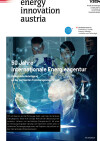Suchergebnisse für "Factsheet%3A Energietechnologien gestalten%2C die f%C3%BCr alle sinnvoll und nutzbar sind"
50 Jahre Internationale Energieagentur

Österreichs Beteiligung an der weltweiten Forschungskooperation
energy innovation austria
1/2024
Herausgeber: BMK gemeinsam mit dem Klima- und Energiefonds
Deutsch, 16 Seiten
Downloads zur Publikation
Pilotkurs Thermische/r SanierungstechnikerIn im Baugewerbe
September - Dezember 2010
HTL Mödling, Technikerstraße 1-5
2340 Mödling, AT
Der Kurs wird von September bis Dezember 2010 abgehalten. Anmeldungen können ab sofort bis zum 23. August 2010 erfolgen.
Publikationen aus dem IEA Bioenergie Task 42
Im IEA Bioenergie Task 42 wurden ein Newsletter, der Bericht "Bioeconomy Survey 2014" sowie Biorefinery Fact Sheet publiziert.
IEA EBC Annex 80: Resilient Cooling of Buildings – Policy Recommendations (2024)

Empfehlungen für regulatorische Maßnahmen
Peter Holzer, Institute of Building Research & Innovation, Österreich; Pierre Jaboyedoff, Effin’Art, Schweiz; Emmanuel Bozonnet, La Rochelle Université, Frankreich; Ronnen Levinson, Lawrence Berkeley National Laboratory, USA; Mamak P. Tootkaboni, Politecnico Torino, Italien; Vincenzo Corrado, Politecnico Torino, Italien; Ed Arens, University of California, USA; Haley Gilbert, Affiliate of Lawrence Berkeley National Laboratory; Amanda Krelling, Federal University of Santa Catarina, Brazil; Anaïs Machard, CSTB, Scientific and Technical Center for Buildings, France; Wendy Miller, Queensland University of Technology, Australia; Stephen Selkowitz, Affiliate of Lawrence Berkeley National Laboratory Hui Zhang, Lawrence Berkeley National Laboratory, USA
Herausgeber: IEA EBC Annex 80, 2024
Englisch, 75 Seiten
Downloads zur Publikation
BIPV-Booster - Game changer for façade-integrated PV systems: Development of proof-free constructions regarding fire protection
The central result of the project will be the development of a catalogue of “proof-free constructions” with regard to fire protection for façade-integrated photovoltaic systems, particularly for the more difficult case of high-rise buildings. These constructions will be defined in the project and tested in fire tests. The fire tests are to be supplemented by electrical and material-related module tests before and after the fire tests.
IEA DHC: Artificial Intelligence for Failure Detection and Forecasting of Heat Production and Heat demand in District Heating Networks

Abschlussbericht des Projektes “AI for Failure Detection and Heat Demand and Production Forecast”
Kramer W., Vallée M., Lamaison N., Gölzhäuser S., Wissocq T., Gaoua Y., Bitterling M., Frison L.
Herausgeber: IEA DHC, 2023
Englisch
LenA circular houses - Demonstration of the circular architecture design process for circular andreuse building based on the lighthouse project LenA
The main objective is to research and demonstrate the positive climate impact of reuse in the construction industry. Through this (re)use of components, products and material groups, large shares of the emissions generated by the construction industry can be avoided and contribute to the targeted climate neutrality. Another aspect is to design the connections of the components in such a way that they can be deconstructed and reused.
Neue Publikationen des IEA AFC Annex 35 "Brennstoffzellen für portable Anwendungen"
Im IEA AFC Annex 35 wurden fünf Papers rund um das Thema "Brennstoffzellen für portable Anwendungen" publiziert.
Parabolrinnenkollektor für industrielle Prozesswärme
Im Rahmen eines Projektes der Programmlinie "Fabrik der Zukunft" des BMVIT wurde einkostengünstiger konzentrierender Kollektor mit kleinen Abmessungen nach dem Parabolrinnenprinzip entwickelt.
IEA Bioenergy Task 37: Report "Treatment of pigment wastewater and generation of natural gas standard biomethane in Hangzhou, China" (2021)

Der Report gibt eine Übersicht über ein erfolgreiches Beispiel zur anaeroben Abwasserbehandlung von Pigment-Abwasser in China.
Wei, Xiaoming
Herausgeber: IEA Bioenergy Task 37, 2021
Englisch, 4 Seiten
Downloads zur Publikation
IEA ISGAN Annex 5 (SIRFN): Interconnection Standard Grid-Support Function Evaluations Using an Automated Hardware-in-the-Loop Testbed (2018)

Im Rahmen von IEA ISGAN-SIRFN wurden auf Basis der AIT Smart Grid Converter Plattform automatisierte Tests von netzstützenden Funktionen Smarter Wechselrichter durchgeführt.
Herausgeber: IEEE Journal of Photovoltaics, vol. 8, no. 2, pp. 565-571, doi: 10.1109/JPHOTOV.2018.2794884
Englisch
Neue Publikationen des IEA AFC Annex 31 "Polymerelektrolytmembran-Brennstoffzellen"
Im IEA AFC Annex 31 wurden drei Papers rund um das Thema "Polymerelektrolytmembran-Brennstoffzellen" publiziert.
Optimization in Existing Structures - Implementation Concept for Energy Optimization in the Existing District of Nofels in Feldkirch
The project aims to optimize energy use in the district through savings, densification, retrofitting, and energy storage. Additionally, climate-adapted open spaces are intended to enhance quality of life and resilience. The results will be scaled up to the entire city and make a significant contribution to achieving climate neutrality.
IEA Bioenergy Task 32: Webinar "Residential Wood Combustion – Towards Low Emission Systems" (2021)

IEA Bioenergy Task 32 veranstaltete am 6. Mai 2021 ein internationales Webinar mit dem Titel "Residential Wood Combustion - Towards Low Emission Systems".
Herausgeber: IEA Bioenergy Task 32, 2021
Englisch
In der Praxis angekommen: Fallbeispiele zu Building Information Modeling (BIM) entlang des gesamten Lebenszyklus eines Gebäudes
11. Oktober 2018
COOL MAMA Hotel Salzburg, Josef-Brandstätter-Straße 1, 5020 Salzburg, AT
Im Rahmen der Veranstaltung werden anhand von mehreren Fallbeispielen Building Information Modeling (BIM) Projekte entlang des gesamten Lebenszyklus eines Gebäudes präsentiert. Weiters werden rechtliche Aspekte einer BIM Ausschreibung thematisiert.
IEA Wind Task 32: Workshop Minutes: Workshop 16 - Digitalisation of Wind LiDAR (2021)

Protokoll des Workshops zum Thema Digitalisierung von Wind LiDAR, der am 17. März 2021 als Online-Veranstaltung abgehalten wurde.
Andrew Clifton
Herausgeber: IEA Wind Energy - Task 32
Englisch, 11 Seiten
Webinar: Innovationen in der Kreislaufwirtschaft
15. Dezember 2022, 11:00 - 12:00 Uhr
Online
Webinar von AEE Intec zur aktuellen Ausgabe der Zeitschrift „nachhaltige technologien“ mit dem Schwerpunktthema „Innovationen in der Kreislaufwirtschaft".
IEA Bioenergy Task 39, Newsletter, Ausgabe 63, Oktober 2023

Der Schwerpunkt dieser Ausgabe liegt auf dem Artikel zum Thema „Biofuels production and development in China“.
Tomas Ekbom, Hannah Edgren
Herausgeber: IEA Bioenergy Task 39, 2023
Englisch, 20 Seiten
Downloads zur Publikation
Trends in der internationalen Energieforschung - Schlussfolgerungen für Österreich
7. Jun 2005
Technisches Museum Wien, Festsaal, Mariahilferstr. 212, 1140 WienWien, AT
Veranstaltung im Rahmen der Energiegespräche
Eröffnung des Technologiezentrums aspern IQ
Das Technologiezentrum aspern IQ wurde am 31. Oktober 2012 als erster Hochbau in der Seestadt Aspern in Wien eröffnet. Bundesministerin Doris Bures überreichte Urkunden für dieses "Haus der Zukunft"-Demonstrationsgebäude an das Projektteam.
